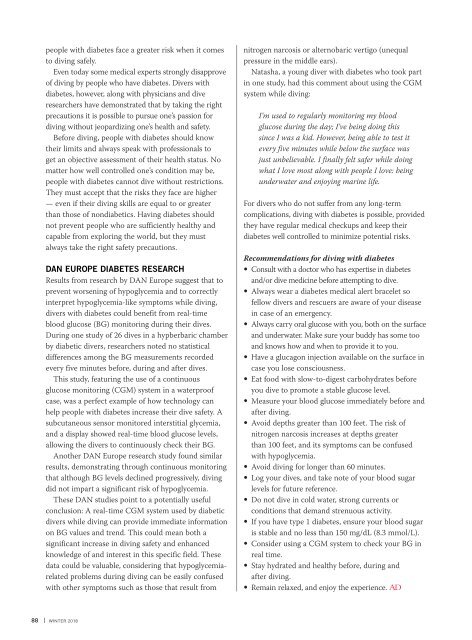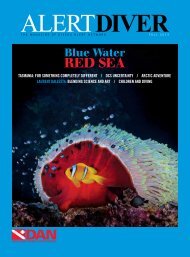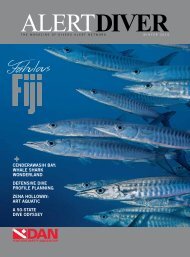AD 2018 Q1
Alert Diver is the dive industry’s leading publication. Featuring DAN’s core content of dive safety, research, education and medical information, each issue is a must-read reference, archived and shared by passionate scuba enthusiasts. In addition, Alert Diver showcases fascinating dive destinations and marine environmental topics through images from the world’s greatest underwater photographers and stories from the most experienced and eloquent dive journalists in the business.
Alert Diver is the dive industry’s leading publication. Featuring DAN’s core content of dive safety, research, education and medical information, each issue is a must-read reference, archived and shared by passionate scuba enthusiasts. In addition, Alert Diver showcases fascinating dive destinations and marine environmental topics through images from the world’s greatest underwater photographers and stories from the most experienced and eloquent dive journalists in the business.
You also want an ePaper? Increase the reach of your titles
YUMPU automatically turns print PDFs into web optimized ePapers that Google loves.
people with diabetes face a greater risk when it comes<br />
to diving safely.<br />
Even today some medical experts strongly disapprove<br />
of diving by people who have diabetes. Divers with<br />
diabetes, however, along with physicians and dive<br />
researchers have demonstrated that by taking the right<br />
precautions it is possible to pursue one’s passion for<br />
diving without jeopardizing one’s health and safety.<br />
Before diving, people with diabetes should know<br />
their limits and always speak with professionals to<br />
get an objective assessment of their health status. No<br />
matter how well controlled one’s condition may be,<br />
people with diabetes cannot dive without restrictions.<br />
They must accept that the risks they face are higher<br />
— even if their diving skills are equal to or greater<br />
than those of nondiabetics. Having diabetes should<br />
not prevent people who are sufficiently healthy and<br />
capable from exploring the world, but they must<br />
always take the right safety precautions.<br />
DAN EUROPE DIABETES RESEARCH<br />
Results from research by DAN Europe suggest that to<br />
prevent worsening of hypoglycemia and to correctly<br />
interpret hypoglycemia-like symptoms while diving,<br />
divers with diabetes could benefit from real-time<br />
blood glucose (BG) monitoring during their dives.<br />
During one study of 26 dives in a hypberbaric chamber<br />
by diabetic divers, researchers noted no statistical<br />
differences among the BG measurements recorded<br />
every five minutes before, during and after dives.<br />
This study, featuring the use of a continuous<br />
glucose monitoring (CGM) system in a waterproof<br />
case, was a perfect example of how technology can<br />
help people with diabetes increase their dive safety. A<br />
subcutaneous sensor monitored interstitial glycemia,<br />
and a display showed real-time blood glucose levels,<br />
allowing the divers to continuously check their BG.<br />
Another DAN Europe research study found similar<br />
results, demonstrating through continuous monitoring<br />
that although BG levels declined progressively, diving<br />
did not impart a significant risk of hypoglycemia.<br />
These DAN studies point to a potentially useful<br />
conclusion: A real-time CGM system used by diabetic<br />
divers while diving can provide immediate information<br />
on BG values and trend. This could mean both a<br />
significant increase in diving safety and enhanced<br />
knowledge of and interest in this specific field. These<br />
data could be valuable, considering that hypoglycemiarelated<br />
problems during diving can be easily confused<br />
with other symptoms such as those that result from<br />
nitrogen narcosis or alternobaric vertigo (unequal<br />
pressure in the middle ears).<br />
Natasha, a young diver with diabetes who took part<br />
in one study, had this comment about using the CGM<br />
system while diving:<br />
I’m used to regularly monitoring my blood<br />
glucose during the day; I’ve being doing this<br />
since I was a kid. However, being able to test it<br />
every five minutes while below the surface was<br />
just unbelievable. I finally felt safer while doing<br />
what I love most along with people I love: being<br />
underwater and enjoying marine life.<br />
For divers who do not suffer from any long-term<br />
complications, diving with diabetes is possible, provided<br />
they have regular medical checkups and keep their<br />
diabetes well controlled to minimize potential risks.<br />
Recommendations for diving with diabetes<br />
• Consult with a doctor who has expertise in diabetes<br />
and/or dive medicine before attempting to dive.<br />
• Always wear a diabetes medical alert bracelet so<br />
fellow divers and rescuers are aware of your disease<br />
in case of an emergency.<br />
• Always carry oral glucose with you, both on the surface<br />
and underwater. Make sure your buddy has some too<br />
and knows how and when to provide it to you.<br />
• Have a glucagon injection available on the surface in<br />
case you lose consciousness.<br />
• Eat food with slow-to-digest carbohydrates before<br />
you dive to promote a stable glucose level.<br />
• Measure your blood glucose immediately before and<br />
after diving.<br />
• Avoid depths greater than 100 feet. The risk of<br />
nitrogen narcosis increases at depths greater<br />
than 100 feet, and its symptoms can be confused<br />
with hypoglycemia.<br />
• Avoid diving for longer than 60 minutes.<br />
• Log your dives, and take note of your blood sugar<br />
levels for future reference.<br />
• Do not dive in cold water, strong currents or<br />
conditions that demand strenuous activity.<br />
• If you have type 1 diabetes, ensure your blood sugar<br />
is stable and no less than 150 mg/dL (8.3 mmol/L).<br />
• Consider using a CGM system to check your BG in<br />
real time.<br />
• Stay hydrated and healthy before, during and<br />
after diving.<br />
• Remain relaxed, and enjoy the experience. <strong>AD</strong><br />
88 | WINTER <strong>2018</strong>









